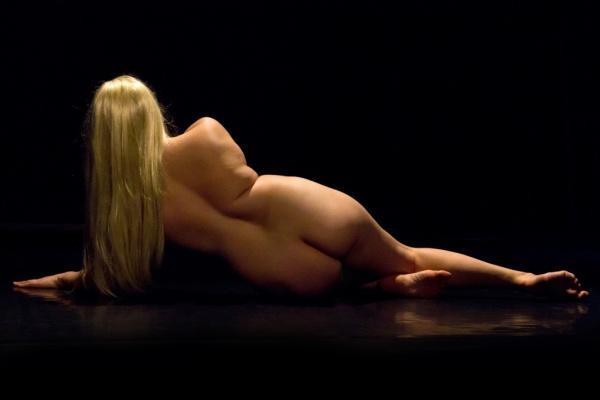
JOSHA. Photo: Edith Kozár.
On 27 and 28 February Prague’s Ponec Theatre (Husitská 24a/899) will host presentations of Polish dance pieces. Friday, 27 February (8 pm) will be chance to see JOSHA by Márta Ladjánszki performed by Joanna Leśnierowska to an accompaniment by musician and composer Zsolt Varga.
On Saturday, 28 February (8 pm) the Ja Ja Ja Ne Ne Ne collective will perform Fight, fight ?that’s all we can do, a duo developed and performed by Magda Tuka and Anita Wach.
About the pieces:
JOSHA
“The dancer’s small, repetitive gestures are precise and meaningful. (…) She is fully present in her body. Her honesty is brave and compelling, ?cause being yourself on stage is the hardest thing ever. Imagine: no role or costume to hide behind and every part of your body that can shake is cruelly shaking now. A moving performance it was by all means.” (Emese Kovács).
“Expressed in the language of dance, the monodrama draws on a specific genre: a portrait. Márta Ladjánszki presents the performer in an extremely simple way, while forcefully insisting on informality of approach. The resulting choreography is stylistically coherent and intellectually intimate as the choreographer stays in the shadows. The power and simplicity of the choreographic gesture is much braver on Ladjánszki’s part that fighting hand in hand with Josha on the front line.”
? Glória Halász
Direction / Choreography: Márta Ladjánszki
Performer: Zsolt Varga (musician) and Joanna Leśnierowska (performer)
Music: Zsolt Varga
Costume Design: Butterfly and Manier Salon (Németh Anikó)
Lighting designer: TomášMorávek (CZ) / Katarína Ďuricová (SK)
Supported by: L1 Association, Art Stations Foundation, NKA Dance Department, NEFMI, International Visegrad Fund VARP-PA, Fabrik Potsdam, cie. Public In Private, Studio 142 Berlin, Polish Institute Budapest, Czech Centrum Budapest, Műhely Alapítvány, Bakelit M.A.C., Salvador Cabaret
In the frame of Performing V4 – Biennial of VARP-PA Residents.
Márta Ladjánszki is an independent choreographer and dancer based in Budapest. She is mainly inspired by the body, its internal life, and expression through movement. The artist believes that everyone brings into the world the wealth of their extraordinariness (both physical and spiritual) and this extraordinariness is the topic of her pieces.
Joanna Leśnierowska is a dramaturge, dance critic and curator, and performer. She has been running the Old Brewery New Dance project in Poznań, Poland, since 2004. She also works as a dramaturge and consultant, collaborating with Polish and international artists (Janusz Orlik, Renata Piotrowska, Arkadi Zaides, Minimetal, Lia Haraki). In September 2011 she debuted as choreographer with Rekonstrukcja [Reconstruction].
Zsolt Varga is a Hungarian composer, multi-instrumentalist, sound and movement artist. He began his career as a saxophone player, improvising in Budapest-based collectives MCLoecky and the Bálvá-nyos Ensemble. Today he plays in a leading free jazz band, the McRibben-trop Trio. Not only does he write music for Márta Ladjánszki choreographic pieces, but also performes in many of them.
Fight, fight ? that’s all we can do
Fight, fight – that’s all we can do, a physical poem inspired by Olympic and US-style wrestling choreographed by Magdalena Tuka, and featuring her and Anita Wach as performers.
M: Many of you are asking me why wrestling? Wrestling is my song of love, song of freedom.
A: What do I like about fighting? That I never know what to expect next, it’s a source of constant surprises, you have to be ready for them.
M: Yeah. Fight, fight – that’s all we can do, and the show must go on!
Fighting for entertainment has been popular since time immemorial. The famed Nubian wrestlers of pre-antiquity became slaves set to please the Egyptian invader. Wrestling’s simple form mixed with the danger it may cause (to health, or even life) can provide the spectator with a unique experience.
Concept and directing: Magda Tuka
Performers: Magda Tuka, Anita Wach
Fight, Fight ?that?s all we can do was developed during an artistic residency at Stanica Žilina-Záriečie, Slovakia, which was supported by the Visegrad Fund. It premiered on 13 June 2013 at S2, Stanica Žilina-Záriečie, Slovakia.